Hitting the reset button leads Miami University’s Entrepreneurship program to become one of the best in the world
Momentum is building at the Lee and Rosemary Fisher Innovation College@Elm, where Entrepreneurship students and student-founders find mentorship and guidance
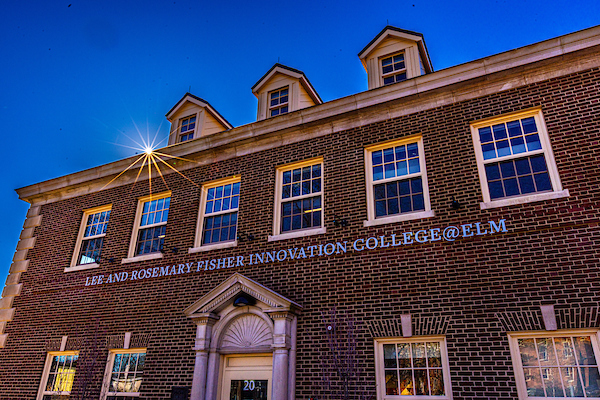
Hitting the reset button leads Miami University’s Entrepreneurship program to become one of the best in the world
This is the first of a three-part series on Miami's Entrepreneurship program. Read part two and part three.
Ask Tim Holcomb what makes Miami University’s Entrepreneurship program one of the best in the world, and he’ll take you back to 2015 when they took a hard look at things.
The program was doing well, already eight years into the Top 10 rankings. But it was much like other programs across the country — filled with lectures, textbooks, and faculty spending a lot of time teaching students about entrepreneurship.
But Holcomb, chair and professor of Entrepreneurship and director of the John W. Altman Institute for Entrepreneurship, said they didn’t feel like they were maximizing the value they could have on 18- to 22-year-old students who want to start their own businesses.
“So we hit the reset button,” he said, “and we made a conscious decision to spend less time teaching students about things and spending more time teaching them to do things.”
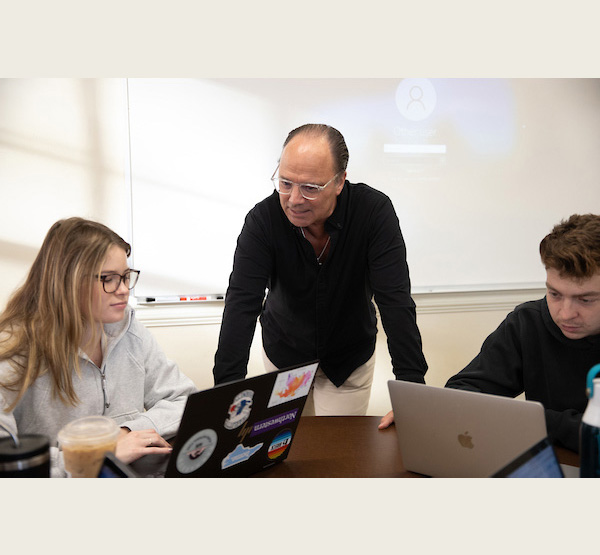
The reboot pays off
Faculty flipped the model to active learning, evaluating everything around interdisciplinary team-based efforts such as starting companies or social ventures and doing innovation projects for clients.
And that next year? They began phasing out the Entrepreneurship major — replacing it with an Entrepreneurship co-major, which requires students to complete a primary major in any academic division at Miami’s Oxford campus.
The change was made because the Entrepreneurship major had required students to take 30 hours of the business school core. And while that was fine for Finance, Economics, Marketing, and Management majors, it didn’t work for others across campus such as Engineering majors because there was no room in their busy schedules to squeeze in those 30 hours.
The reboot has paid off in a big way:
- This year, the John W. Altman Institute for Entrepreneurship and the Department of Entrepreneurship won the 2024 Model Entrepreneurship Program Award for the top undergraduate and/or graduate program in the world by the U.S. Association for Small Business and Entrepreneurship.
- That accomplishment comes on the heels of winning the NASDAQ Center of Entrepreneurial Excellence Award in 2020, awarded annually by NASDAQ and the Global Consortium of Entrepreneurship Centers, as the top entrepreneurial program in the world.
- The Princeton Review has ranked it among Top 10 public universities programs for 16 consecutive years, including No. 7 overall globally in 2024 — the program’s highest global ranking ever.
“Our secret sauce is in the engineering of our curricular and co-curricular programming around interdisciplinary education and practice-based immersive learning,” Holcomb said.
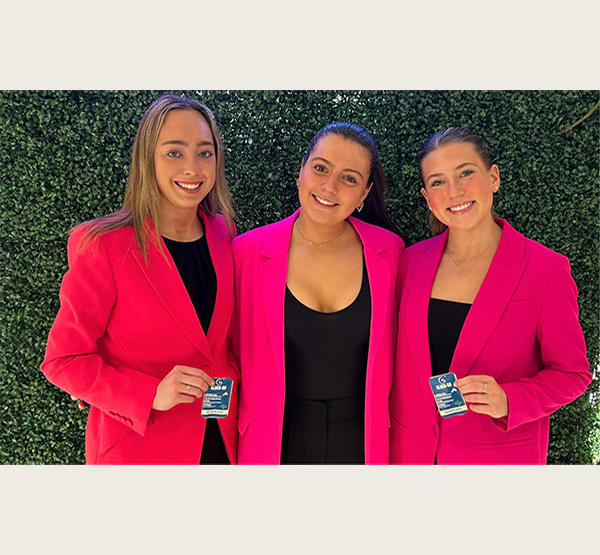
Pulling from every undergraduate major
Last year, 4,160 Miami students took at least one Entrepreneurship course, while approximately 1,200 students participated in one or more of the co-curricular programs such as Techstars Startup Weekend, Social Innovation Weekend, the RedHawk Launch Accelerator, World Creativity & Innovation Week, the RedHawk Venture Pitch Competition, or one of the program’s two student-managed programs — RedHawk Ventures and the Social Impact Fund.
For four consecutive years, the program has had at least one student from every undergraduate major across campus.
“Over the past decade, Miamians have founded and led more than a dozen companies with unicorn valuations (worth more than $1 billion), and those companies were founded by Miamians that graduated with degrees in Zoology, Public Policy, Computer Science, Marketing, and Finance, among others,” Holcomb said.
Having at least one student from every undergraduate major involved in entrepreneurship is significant, he said, because “there is no one college or division, including the Farmer School of Business, that owns the franchise on entrepreneurship.”
That is evident with three Miami students who took their idea for a health care innovation to an international pitch competition in Texas this spring.
Amanda Simeone, a junior Finance major and Entrepreneurship co-major; Paula Ambit Martinez, a senior Engineering Management major; and Kelsey Gruber, a first-year Accountancy major and Entrepreneurship co-major; are co-founders of Gluco-Go.
Gluco-Go’s quick, emergency dose of glucose via two mint-flavored strips, would help those with Type 1 diabetes deal with low blood sugar episodes.
The team, which finished second at last November’s Startup Weekend, qualified for Texas Christian University’s Values and Ventures Competition.
Simeone came up with the product idea after a health scare involving her mother, who was diagnosed with Type 1 diabetes when Amanda was 15. “Witnessing firsthand the daily challenges that she faced, I was struck by the lack of accessible resources for individuals with Type 1 diabetes.”
She wanted to develop a product to help, especially after Thanksgiving break her sophomore year when her mom passed out in the kitchen after experiencing a sudden, rapid drop in blood sugar.
Simeone began brainstorming product ideas, but things didn’t come together until Startup Weekend.
“My pitch attracted a team of motivated individuals, and together, we redefined and reshaped the concept, ultimately creating our first iteration of Gluco-Go,” she said, calling it rewarding to see positive feedback from those in Type 1 diabetes community on the product they are developing.
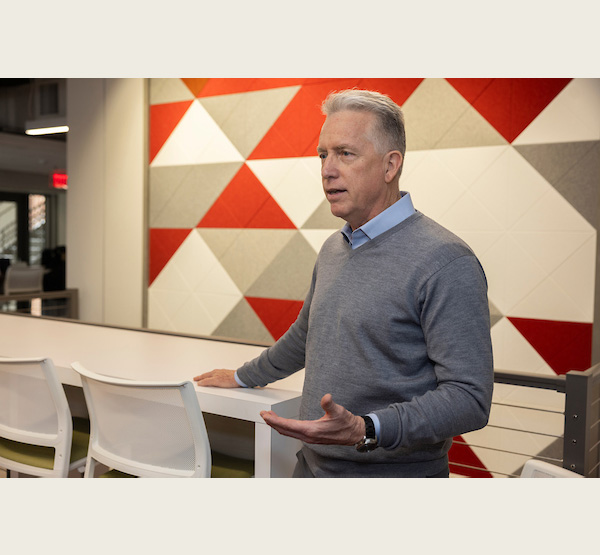
Miami’s new innovation hub in Oxford
Over the past decade, nearly 1,000 Miami student-founders and future entrepreneurial leaders have pitched more than 500 potential startups to angel investors, venture capitalists and growth equity investors, startup and social enterprise accelerator directors, founders of high-growth companies, as well as startup and business professionals.
This spring, Martinez and Simeone received speed mentoring from experienced venture and growth equity investors from Ohio Innovation Fund, CincyTech, Cintrifuse Capital, and others at the Lee and Rosemary Fisher Innovation College@Elm in Oxford, Miami’s new innovation hub where student-founders can receive feedback from mentors with direct experience in startup ventures.
It has helped them expand their network and forge new connections, Simeone said.
“It’s been amazing to see how many people are willing to help us,” she said. “I am very fortunate to be a part of this community that fosters innovation and provides a strong support system.”
More than 20 student-led, potential high-growth startups are gearing up for the John W. Altman Institute for Entrepreneurship’s $100,000 RedHawk Venture Pitch Competition on May 9 in the Farmer Business School’s Taylor Auditorium.
Among those mentoring the students are Mark Richey ’80, co-founder and partner of 1809 Capital, a venture capital fund based at Fisher Innovation College@Elm. Launched in 2022, 1809 Capital leverages a network of Miami University alumni to benefit Entrepreneurship at Miami.
“Working with the Redhawk Venture Pitch teams and their instructors is a blast and motivating. The teams and their ideas are impressive,” said Richey, who worked with Gluco-Go to help them fine-tune their pitch.
Richey noted that capstone students in Entrepreneurship, the College of Engineering and Computing, and Nursing are using the mentoring resources.
While programming has focused on developing mentoring resources for students and faculty, it expanded this spring to include a speaker series, a summer startup accelerator, as well as idea generation and development labs in gaming, creative arts, and health care analytics.
“The concept of a College@Elm and the idea of 1809 Capital were developed separately, so it’s fortuitous that the missions of both converged seamlessly,” Richey said.
Fisher Innovation College@Elm executive director Chris Lawson echoed the sentiment. “What came together was the advisement expertise of 1809 Capital as a value-add component of the College@Elm ecosystem.”
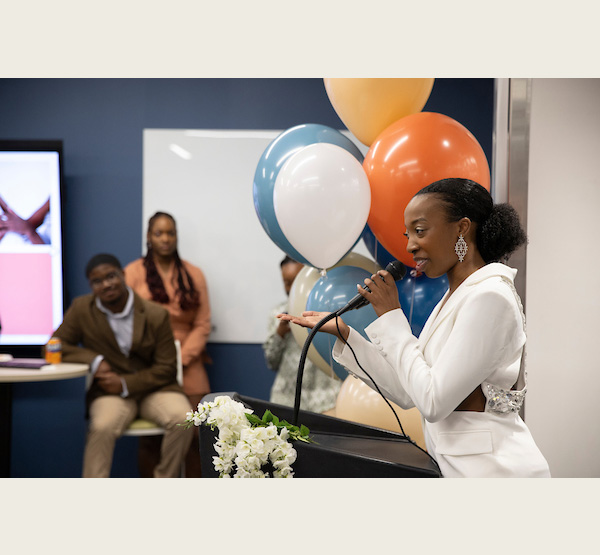
Entrepreneurs working side by side
Richey sees Fisher Innovation College@Elm as a startup itself, and momentum is building at the 39,000-square-foot brick building at 20 S. Elm St.
Recently, entrepreneur VaLanDria Smith-Lash ’23 held a ribbon cutting for her skin care business, Coarse Culture. The company is an original anchor tenant with on-site production, nationwide distribution, and leadership-development opportunities for undergrads.
Other startups also are using the building, including an artificial intelligence company co-founded by a Miami professor and the advanced air mobility drone startup, Electrum Aero.
Richey — who also serves as entrepreneur-in-residence through Miami’s ASPIRE office to develop programming — noted that generating ideas and launching companies is not just a business exercise.
“Most often, problem or opportunity identification comes from other disciplines such as science, engineering, nursing, creative arts, and others,” Richey said.
More than 80 Miami alumni are now limited partners providing investment capital through 1809 Capital, and the goal is to donate $1 million to the Miami Foundation to benefit startups in the next few years.
“We also provide access to the network of alumni we are developing to assist and support entrepreneurship efforts across the university,” he said.
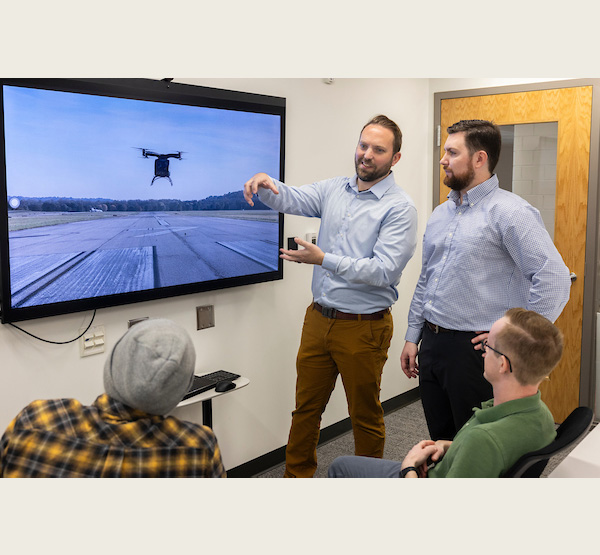
Electrum Aero to work with students
Electrum Aero’s Jeffrey Bennett, CEO and head of business development, and Justin Jantzen, certification and flight-testing lead, are University of Cincinnati graduates in their six-person startup.
The entrepreneurs said they were drawn to Miami’s Fisher Innovation College@Elm for two main reasons: the nearby Miami University Airport and the strong talent pool of students from both the Farmer School of Business and the College of Engineering and Computing (CEC).
They hope to start working with CEC students within 12 to 18 months through internships and co-ops — eventually ramping up in the third year with a goal to hire former interns after they graduate.
“We envision a big partner,” said Jantzen, of Hamilton.
That kind of collaboration is what Miami President Gregory Crawford, Holcomb, and others envision for Fisher Innovation College@Elm — a place where Entrepreneurship students and student-founders can work with or alongside entrepreneurs.
“I think the potential for it is as a landing spot for students and faculty while they’re here who are interested in startups and innovation programs that will produce technology that could be commercialized,” Holcomb said.